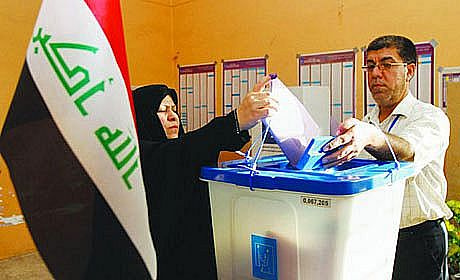If Elections Are Not Held

Worrying reports and irresponsible statements are being heard from different sides on the ground that the elections might be postponed or not held at all. Based on the excuse of using Article 6 of the Election Law which states that “The election must be held in Iraq in one day in the entire country”, some people talk about the suspension or cancellation of the election.
Meanwhile, the situation might move towards the direction where a state of emergency might be declared by the government and the elections would be postponed. Despite the fact that, in the first stage, everything is clear and the objective behind Article 6 is to prevent vote fraud, it is necessary for the High Election Council or the Union Tribunal to present a clear interpretation of this article or that the parliament adopt a law and state clearly that elections are held in those places where it is possible and, in other regions where elections could not be held, they can hold it on a later date and be postponed for another time. Otherwise, everything will be faced with a political gamble which would be very dangerous for the country.
If elections are not held, there would be no parliament and all institutions of the country would be completely shut down for the “presidential term is finished by the terms of the parliament representatives” (according to Article 72, Item 2/1). The non-existence of the House of Representatives will cause “the council of ministers to be declared dismissed and a daily executive government would come to power” (Article 64/2).
Perhaps it is not necessary for the elections to be held in one day as there is voting under special circumstances and voting outside the country. There would be no problem if an emergency situation arises that would postpone the election in one province or area. But elections should not be stopped in all provinces, because elections are the main principle of law-making and executing power and will legitimize the government. Therefore, it is impossible to leave the country without any political government.
But under what circumstances is a state of emergency declared? Based on Item 9 of Article 61 of the Constitution, if a demand is jointly presented by the Prime Minister and the President in this regard and two thirds of the parliament representatives agree with such a demand, the government could, for 30 days, declare a state of emergency and, for its renewal, the parliament must, each time, approve this demand and an instruction should be issued by the president.
Meanwhile, some have referred to the law of “National Health 4” which was adopted in 1965. Based on this law, upon the order of the president and the agreement of the council of ministers, the prime minister is issued permission to execute whatever he deems necessary for the national interests of the country and make any decision which he deems necessary in this regard. Among them is holding the tribunals of “national security” which have the right to issue a verdict of execution. It must be said that a dangerous game will be played with the explicit articles on the presidential orders. Declaring a state of emergency and the related responsibilities are beyond the constitution which every country is based upon and this cannot be accepted at all. This is while for years we have been saying and are saying that whatever is against the constitution is rejected.

